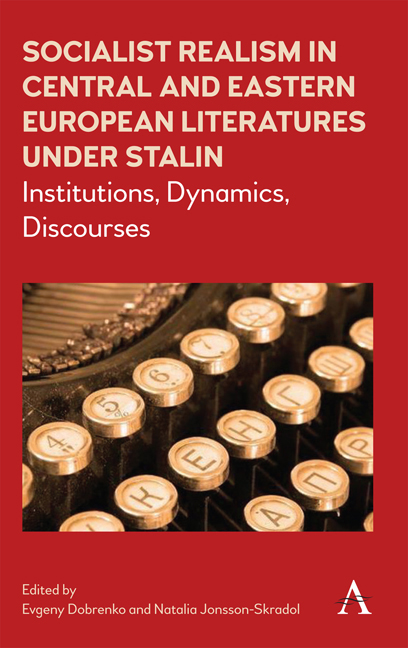 Socialist Realism in Central and Eastern European Literatures under Stalin
Socialist Realism in Central and Eastern European Literatures under Stalin Book contents
- Frontmatter
- Contents
- Acknowledgements
- Introduction
- Part 1 Institutions
- Part 2 Dynamics
- 8 Socialist Writers and Intellectuals in a Divided Nation: The Early GDR Experience
- 9 Stalinism's Imperial Figure: Hero or Clerk of the Pax Sovietica?
- 10 From Avant-Garde to Socialist Realism: Continuities and Discontinuities in Hungarian and Romanian Literature
- 11 The Short Life of Socialist Realism in Croatian Literature, 1945–55
- 12 Literature in Socialist Yugoslavia: Constructing Collective Memory, Institutionalizing the Cultural Field
- 13 ‘Yesterday and Tomorrow’: The Forms of the Slovak Literature of Socialist Realism, 1945–56
- 14 Socialist or Realist: The Poetics of Politics in Sovietized Hungary
- Part 3 Discourses
- Conclusion
- List of Contributors
- Index
14 - Socialist or Realist: The Poetics of Politics in Sovietized Hungary
from Part 2 - Dynamics
Published online by Cambridge University Press: 10 May 2018
- Frontmatter
- Contents
- Acknowledgements
- Introduction
- Part 1 Institutions
- Part 2 Dynamics
- 8 Socialist Writers and Intellectuals in a Divided Nation: The Early GDR Experience
- 9 Stalinism's Imperial Figure: Hero or Clerk of the Pax Sovietica?
- 10 From Avant-Garde to Socialist Realism: Continuities and Discontinuities in Hungarian and Romanian Literature
- 11 The Short Life of Socialist Realism in Croatian Literature, 1945–55
- 12 Literature in Socialist Yugoslavia: Constructing Collective Memory, Institutionalizing the Cultural Field
- 13 ‘Yesterday and Tomorrow’: The Forms of the Slovak Literature of Socialist Realism, 1945–56
- 14 Socialist or Realist: The Poetics of Politics in Sovietized Hungary
- Part 3 Discourses
- Conclusion
- List of Contributors
- Index
Summary
One of the main questions related to the process of Sovietization in Eastern and Central Europe is whether there were any common points in the vision or direct political aspirations of the conquerors and the conquered, at least on the level of the political elites. If they did share any visions and ideas, we can assume that these may have facilitated to a certain extent a peaceful Sovietization by means of ‘soft’ methods even in societies that had been originally rather unfriendly towards communist policies. An analysis of some shifts and turning points in the political and cultural development of Hungary over the first post- war years, and the accompanying representative philosophical and literary debates, can help shed light on why an examination of these matters is both challenging and vital to our understanding of the period.
Politics
In the immediate post- war period the Soviet leadership was primarily busy restoring and stabilizing the executive mechanisms in core areas of the newly expanded empire, that is, in the Soviet Union proper. This process was accompanied by many top- level ideological resolutions that reflected the patterns of political visions and practices, new requirements concerning lifestyle, artistic tastes and ways to monitor the arts. However, Andrei Zhdanov, the chief Soviet ideologist, clearly indicated already in 1946 that it would not be long until the Sovietization of the Eastern European region would follow suit.
Which is not to say that the pace at which this process would unfold was at once clear to the elites of the conquered countries in the early post- war years. Similarities of the various Communist Party programmes in the so- called coalition period were not the result of external political pressure, but rather a product of having been lagging behind the West in the modernization process. At the time when mass societies just started to emerge in the region, post- war radical movements across Eastern Europe were formulating popular cultural programmes. This was the common ideological basis for a wide range of political and artistic groups in the countries of the region. The majority of the coalition parties envisioned educational, cultural and artistic reforms that would enable the broad masses to have access to education and culture and thus achieve greater social mobility and equality.
- Type
- Chapter
- Information
- Socialist Realism in Central and Eastern European Literatures under StalinInstitutions, Dynamics, Discourses, pp. 217 - 234Publisher: Anthem PressPrint publication year: 2018


